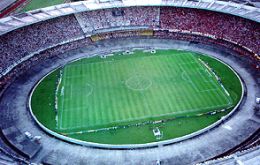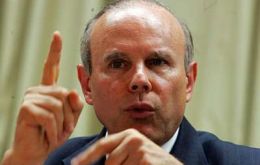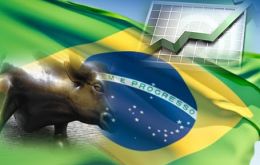MercoPress. South Atlantic News Agency
Tag: Brazil
-
Saturday, July 30th 2011 - 22:43 UTC
South America as a region to discuss measures to counter global financial crisis

South America’s top economic and monetary authorities will be meeting in Lima and later in Buenos Aires to agree on “joint and specific actions” to address the flush of global liquidity distorting regional currencies and of unsold manufactured goods threatening jobs and industry.
-
Saturday, July 30th 2011 - 22:33 UTC
Cristina and Dilma reaffirm ‘strategic alliance and commitment to Mercosur

Argentina and Brazil reaffirmed on Friday their strategic alliance and commitment to Mercosur and regional integration during a summit in Brasilia, where President Cristina Fernández de Kirchner together with her Brazilian peer Dilma Rousseff inaugurated the new Argentine Embassy in the Brazilian capital.
-
Friday, July 29th 2011 - 10:35 UTC
Brazil begins exporting rice to South Africa, competing with Thailand

Brazil has begun shipping rice to South Africa, competing with Thailand, the largest source of the grain for Africa’s largest economy. A shipment of rice from Brazil’s Santa Catarina state left Santos bound for South Africa this week.
-
Friday, July 29th 2011 - 06:40 UTC
World Cup set to boost Brazil’s GDP by 1.5%, estimates the country’s main bank

The three-year build-up to the 2014 soccer World Cup is set to boost Brazil’s economy by 1.5% of GDP, according to Ilan Goldfajn, chief economist of the Itau Unibanco Holding, Latin America’s largest bank by market value.
-
Friday, July 29th 2011 - 06:32 UTC
Claims China is ‘circumventing’, via US, to avoid Brazil anti-dumping tariffs

Brazilian newspaper Estado de Sao Paulo revealed documents from Chinese company Sun Falcon International Inc. offering triangulation scheme through Los Angeles port, the busiest container port in the US, to avoid Brazilian anti-dumping tariffs.
-
Friday, July 29th 2011 - 06:27 UTC
Brazil has not been ‘soft’ on Argentina and on imports from China

Brazilian officials brushed aside claims from exporters that the country has been ‘soft’ on Argentina and on imports from Asia, mainly China, arguing that trade figures indicate something different and “you can’t have it both ways, liberal and protectionist”.
-
Friday, July 29th 2011 - 06:25 UTC
Rio’s Maracana stadium will host the 2014 World Cup final

Rio de Janeiro's famous Maracaná stadium will host the final of the 2014 World Cup in Brazil, FIFA secretary general Jerome Valcke indicated Thursday, pending formal ratification of the decision at FIFA executive committee meeting in October.
-
Thursday, July 28th 2011 - 20:30 UTC
Second rescue plan “too tough for Greece, too light for private creditors”

Representatives of leading emerging market countries at the IMF have warned the Fund's management against pouring more large sums of money into Greece's second bailout, the Financial Times reported on Thursday.
-
Wednesday, July 27th 2011 - 19:28 UTC
Brazil intervenes the derivatives markets in a bid to weaken the Real

Brazil imposed on Wednesday a tax on bets against the US dollar and warned it may boost intervention in the nation’s derivatives market in a bid to weaken a currency that reached a 12-year high this week. The Real declined by the most in almost three months at times loosing up to 2% to the US dollar.
-
Wednesday, July 27th 2011 - 04:49 UTC
Brazil’s development bank lends 30bn dollars at subsidized rate in five months

Lending by Brazil’s BNDES (National economic and social development bank) totalled 43.5 billion Real (29bn dollars approx) in the first five months of the year, representing a contraction of 6% compared to the same period in 2010, according to a bank’ release.
